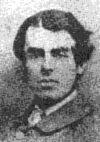Erewhon

Samuel Butler 1872
Source: Fireblade, by Jerry Stratton.
Samuel Butler (1835-1902) used his satirical tale, Erewhon, to promote of his alternative interpretation of the evolution of species, which accorded cells a will and a capacity to shape their environment and to pass acquired habits on to its progeny. Butler satirises the injustices of Victorian England by means of a utopian society in which all the social mores and laws were the exact opposite of what they were in England, just as its ideas about evolution were different.
“If a man falls into ill health, or catches any disorder, or fails bodily in any way before he is seventy years old, he is tried before a jury of his countrymen, and if convicted is held up to public scorn and sentenced more or less severely as the case may be. ... But if a man forges a cheque, or sets his house on fire, or robs with violence from the person, or does any other such things as are criminal in our own country, he is either taken to a hospital and most carefully tended at the public expense, or if he is in good circumstances, he lets it be known to all his friends that he is suffering from a severe fit of immorality, just as we do when we are ill, and they come and visit him with great solicitude.”
Prefaces
Chapter 1: Waste lands
Chapter 2: In the woolshed
Chapter 3: Up the river
Chapter 4: The saddle
Chapter 5: The river and the range
Chapter 6: Into Erewhon
Chapter 7: First impressions
Chapter 8: In prison
Chapter 9: To the metropolis
Chapter 10: Current opinions
Chapter 11: Some Erewhonian trials
Chapter 12: Malcontents
Chapter 13: The views of the Erewhonians concerning death
Chapter 14: Mahaina
Chapter 15: The Musical Banks
Chapter 16: Arowhena
Chapter 17: Ydgrun and the Ydgrunites
Chapter 18: Birth formulae
Chapter 19: The world of the unborn
Chapter 20: What they mean by it
Chapter 21: The Colleges of Unreason
Chapter 22: The Colleges of Unreason (continued)
Chapter 23: The Book of the Machines
Chapter 24: The Book of the Machines (continued)
Chapter 25: The Book of the Machines (concluded)
Chapter 26: The views of an Erewhonian prophet on the rights of animals
Chapter 27: The views of an Erewhonian prophet on the rights of vegetables
Chapter 28: Escape
Chapter 29: Conclusion